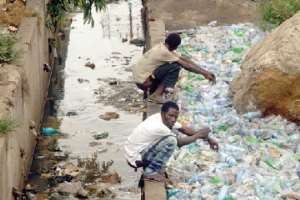
According to the United Nations, “a vast majority of the world's population has access to mobile phones, one third of humanity (2.5 billion people) do not have access to proper sanitation, including toilets or latrines, with dramatic consequences on human health, dignity and security, the environment, and social and economic development.”
The United Nations General Assembly in July 2013 adopted the “Sanitation for All” Resolution (A/RES/67/291) which made 19 November, World Toilet Day. The day aims to improve behaviour and policy on issues of water management and open-air defecation, popularly known as “free range” which, according to the United Nations, 1.1 billion people practice worldwide.
According to the U.N Secretary-General, Mr. Ban Ki-Moon, more than 800,000 children under five die from diarrhea annually. This means that more than one child dies every minute due to poor sanitation. Research has shown that, the lack of private toilets in schools is one of the major reasons why adolescent girls do not continue their education once they enter puberty. Poor sanitation and lack of toilet facilities to the vulnerable in society such as persons with disabilities and women expose them to all forms of assaults. Statistics show that, developing countries lose $260 billion annually to poor sanitation which is 1.5 per cent of their gross domestic product. Available statistics show that, at current rates of progress, it will be over 165 years before Sub-Saharan Africa meets its Millennium Development Goals target on sanitation, and another 350 years to get to universal access.
Ghana's case is not different. According to WaterAid in Ghana, a non-governmental organisation in water, sanitation and hygiene, 10.5 million women and girls lack safe and adequate sanitation. 2.3 million out of this number do not have access to a toilet at all. 4.8 million Ghanaians are said to practice open defecation or “free-range” every day. According to a World Bank Water and Sanitation Programme (WSP) report released on April 17, 2012, Ghana's economy loses GH¢ 420 million each year, due to poor sanitation. This is estimated to be 1.6 per cent of gross domestic product.
As we celebrate World Toilet Day, we must reflect on pragmatic ways of improving the toilet situation especially in our urban areas. Sanitation habits are cultivated and reinforced over the course of a lifetime. We must work to educate communities in order to change cultural perceptions and long-standing practices. 11 per cent more girls will remain in schools when there are decent toilets. Women and the disabled will have access to a private latrine so that they are less vulnerable to assault of all kinds. The U.N Secretary-General, Mr. Ban Ki-Moon's “Call to Action on Sanitation” to end open defecation by 2025 must be given all the seriousness it deserves. Efforts such as the Sanitation and Water for All and the Sanitation Drive to 2015 among others must be boosted. If Ghana must meet the date for achieving the Millennium Development Goals 7(c) to half, the proportion of the population without sustainable access to safe drinking water and basic sanitation by 2015, then an arduous task faces us as a nation. We all must work together to fasten our nation's pace in achieving this goal.
Mr. Ban Ki-moon was right when he said “By working together – and by having an open and frank discussion on the importance of toilets and sanitation – we can improve the health and well-being of one-third of the human family”. We are all involved in building Ghana.
Gabriel Edzordzi Agbozo Is The Director Of International Affairs At Beyonders Foundation. [email protected]




 Reintroduce Fiscal Responsibility Act to tackle election budget overrun — Osafo ...
Reintroduce Fiscal Responsibility Act to tackle election budget overrun — Osafo ...
 Flooding: Obey weather warnings – NADMO to general public
Flooding: Obey weather warnings – NADMO to general public
 Fire in NDC over boycott of Ejisu by-election
Fire in NDC over boycott of Ejisu by-election
 NDC to outdoor Prof Jane Naana Opoku-Agyemang as running mate today
NDC to outdoor Prof Jane Naana Opoku-Agyemang as running mate today
 Ejisu: CPP seeks injunction to stop April 30 by-election
Ejisu: CPP seeks injunction to stop April 30 by-election
 Dismiss ECG, GWCL, GACL bosses over losses – United Voices for Change tells gov’...
Dismiss ECG, GWCL, GACL bosses over losses – United Voices for Change tells gov’...
 Submit 2023 audited financial statements by May – Akufo-Addo order SOEs
Submit 2023 audited financial statements by May – Akufo-Addo order SOEs
 Current power outages purely due to mismanagement – Minority
Current power outages purely due to mismanagement – Minority
 ECG hoists red flag to fight Ashanti Regional Minister over arrest of General Ma...
ECG hoists red flag to fight Ashanti Regional Minister over arrest of General Ma...
 Mahama’s 24hr economy will help stabilise the cedi; it’s the best sellable polic...
Mahama’s 24hr economy will help stabilise the cedi; it’s the best sellable polic...
